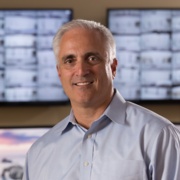Don Berchoff, CEO, TruWeather Solutions Inc.

Please include details about your educational background and what sparked your interest in atmospheric or related sciences.
BS in Meteorology, MS in International Studies, MA in Procurement Management
I wanted to be a weather person since I was 7 years old. My 2nd grade teacher said something to the effect, "High pressure means cold and dry and low pressure means mild and wet." I asked her, "Then how does it snow?" She stumbled on the answer, and of course there was no internet then... I had to try to figure this out from library books. I did not find a satisfactory answer until years later, but I was hooked.
What makes atmospheric science so compelling is there is so much more to figure out. I love the challenge of trying to make sense of the puzzle without having all the pieces... and then communicating what we do know to improve business and society.
What was your first job in the field and how did you end up in the job you are in now?
U.S. Air Force. 24 years and challenged me in so many ways that it prepared me for higher level challenges in learning more deeply about the science and to become a "technologist." This gave me the capability to become the Science and Technology Director at the NWS, which further increased my knowledge about "what is possible." So much great science and technology in the labs and universities needs a bridge over the "research to operations valley of death." My focus now, as a business person, is to use all the knowledge and expertise gained and to accelerate great science and technology directly into commercial applications to provide more tools and capabilities to weather sensitive businesses.
What opportunities did you pursue that you knew would be beneficial to securing a job in the profession?
In the old school days, preparing for a profession was so different than it is today. We did not need to do internships. Most of the preparation was through school. In my case, I became the Meteorology Club President and became a student member of AMS. Being the Club President, I was asked by the Air Force if they could present at a club meeting. They came, and I signed up with the Air Force.
What other courses/skills beyond the required math and science courses do you think would be the most helpful to individuals wanting a career in your profession?
Risk management, data science, artificial intelligence (especially machine learning), business principles around risk and actuary understanding.
What is your typical day on the job like?
As a business owner, I lead my team in designing and building new products, running our IT stacks, building marketing materials, hiring atmospheric scientists and software engineers, doing checks on forecast quality control, mentoring young meteorologists on old school forecast techniques, and closing business deals.
What do you like most about your job? What is the most challenging thing about your job?
Growing young folks into productive members of the business and watching them take more and more responsibility and becoming great young professionals. The most challenging aspects of the job is ensuring we have enough revenue and cash to keep the business growing.
Does your job allow for a good work/life balance? If not, why?
My workers choose how they want to work and live. I am not a good person to ask this question because weather is a job and a hobby, so my work and life are blended due to my passion and love of meteorology. Plus... building a business is hard. And I am focused on accelerating the advancement of innovative weather analytics and decision tools for businesses and the industry. I work a great deal. If you love something enough, want to be really good at it and succeed in meeting some tough goals, it takes time and effort. I would not have it any other way.
Over the course of your career what is the most exciting thing that has happened to you?
Leading an Air Force Base in Central Asia, flying a combat mission over Afghanistan, forecasting for Air Force One, building a 180-person weather center, delivering Dual Polarization to the Nation's WSR-88D Network, and whenever nailing a mission critical forecast when the models were uncertain and I had to use all the lessons and heuristics I can muster to make the right call. These are just a few of the exciting things... did not mention briefing Henry Kissinger, having over 300 hours as an airborne meteorologist on KC-135, KC-10s, EC-135s...
Is there anything you wish you had done differently in your career?
No
What are some “must haves’’ on a resume if a person wants to gain employment in your field?
I view them as "must haves" as a person...resumes tell me what you did...but it is about the person. Unselfish; integrity in all they do; team player; critical thinker; diligent; problem solver, not problem passer; a finisher; and most importantly a willingness to learn, apply those lessons and a high aptitude for understanding scientific and technical principles. If someone practices these, they can learn and do anything. Someone that is only out to check boxes to have a nice looking resume, but does not exhibit the values and capabilities outlined above, will not get hired by me.